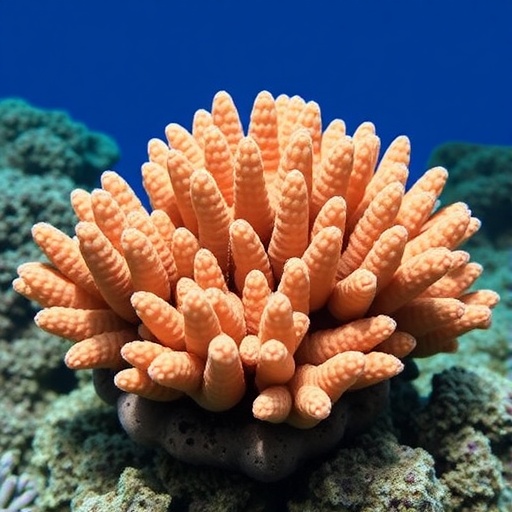In a groundbreaking study published in 2025 in the journal Coral Reefs, researchers led by Plichon et al. delve into the adaptations of Porites corals from the Palau Archipelago in response to the ever-pressing threat of ocean acidification. As anthropogenic activities continue to emit substantial amounts of carbon dioxide into the atmosphere, the ocean absorbs a significant portion of this gas, resulting in decreased pH levels—a phenomenon that poses a formidable challenge to marine ecosystems. The authors of this study investigate the metabolic shifts and coping mechanisms that enable these corals to survive in an increasingly acidic environment.
The metabolism of corals is a complex interplay of physiological processes that allows them to thrive within their ecosystems. Understanding how these processes are altered when faced with ocean acidification is crucial, particularly given the predicted rise in acidification levels in the coming decades. In their research, Plichon and colleagues aim to uncover specific metabolic pathways that facilitate the corals’ survival and resilience. Their findings could have significant implications for coral conservation and management strategies in a rapidly changing ocean.
The Palau Archipelago, known for its stunning biodiversity and vibrant coral reefs, serves as an ideal location for this research. The region’s coral ecosystems are facing increasing threats from climate change, pollution, and overfishing, making it imperative to study the physiological responses of these corals to environmental stressors. Through comprehensive field studies and laboratory experiments, the researchers collect essential data on coral specimens, focusing on their growth rates, calcification processes, and overall metabolic performance in both controlled and natural settings.
One of the critical discoveries of this study is a remarkable ability of Porites corals to adjust their metabolic functions in response to varying levels of oceanic acidity. By analyzing the corals’ energy consumption and production rates under different pH conditions, the researchers observe a shift toward more efficient energy utilization. This adaptation allows the corals to allocate energy toward vital functions such as reproduction and growth, even in the face of challenging environmental conditions.
Furthermore, the study sheds light on the intricate relationship between corals and their symbiotic partners, the zooxanthellae—photosynthetic algae that reside within coral tissues. The metabolic shifts observed in the corals appear to have a profound effect on the performance and health of these symbiotic organisms. As the corals adapt to higher levels of acidity, there are also changes in nutrient exchange rates between the corals and their algal partners. This dynamic illustrates the delicate balance between corals and zooxanthellae, and how disruptions to this relationship can impact the resilience of coral ecosystems.
The authors highlight the importance of understanding these metabolic shifts as a means to develop informed conservation strategies. By identifying specific molecular and biochemical pathways that confer resilience to ocean acidification, researchers can target these mechanisms in conservation efforts. This research opens up possibilities for employing selective breeding programs to enhance the resilience of coral populations, potentially allowing them to withstand future climate pressures.
In addition to the metabolic insights, the study also presents a broader ecological perspective by examining how shifts in coral metabolism can affect entire reef systems. Coral reefs provide critical habitat for a myriad of marine organisms, and any changes to their health and vitality can have cascading effects throughout the ecosystem. The results of this research indicate that healthier corals, capable of efficiently utilizing energy under stressful conditions, could support richer and more diverse marine communities.
The findings of Plichon et al. contribute significantly to ongoing discourse regarding the impacts of climate change on ocean ecosystems. As coral reefs are often considered the “canaries in the coal mine” for environmental health, understanding their resilience mechanisms is essential for predicting and mitigating the broader effects of global change. This work aligns with international efforts to safeguard marine biodiversity and highlights the urgent need for collaborative action to combat ocean acidification.
In conclusion, the research on Porites corals from the Palau Archipelago represents a vital step toward grasping the complexities of coral resilience amidst the harsh realities of ocean acidification. Through innovative methodologies and rigorous analyses, Plichon and colleagues illuminate pathways for coral survival that could be critical for the future of these remarkable ecosystems. The implications of their findings may resonate throughout the scientific community and inform global initiatives aimed at preserving our oceans for generations to come.
As the repercussions of carbon emissions and climate change become increasingly evident, studies like this emphasize a call to action. By understanding the adaptability of marine species like Porites corals, we are not merely observing a phenomenon but are instead gaining the knowledge necessary to foster resilience within the complicated web of ocean life. Research continues to unveil the remarkable capacity of nature to adapt, even in dire circumstances, igniting hope for the future of our planet’s coral reefs.
Subject of Research: Metabolic shifts in Porites corals due to ocean acidification.
Article Title: Coping with ocean acidification: metabolic shifts in Porites corals from the Palau Archipelago.
Article References:
Plichon, K., Tredez, M., Roberty, S. et al. Coping with ocean acidification: metabolic shifts in Porites corals from the Palau Archipelago.
Coral Reefs (2025). https://doi.org/10.1007/s00338-025-02728-4
Image Credits: AI Generated
DOI: 10.1007/s00338-025-02728-4
Keywords: Coral reefs, ocean acidification, metabolic shifts, Porites, Palau Archipelago, resilience, marine ecology.




